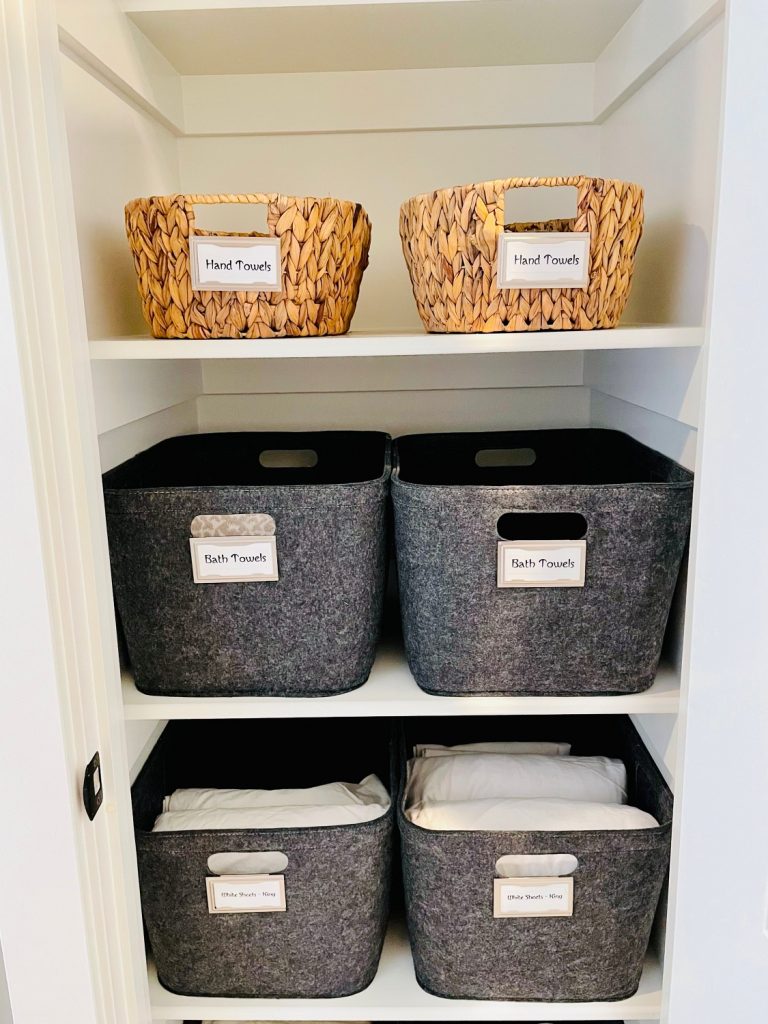People often want to know how much of something is the “right amount” to own. It could be pairs of shoes, toys, sheets or towels – any number of things. In reality, there’s no right or wrong. What feels like the right number for one person won’t necessarily feel that way to someone else. I like the motive behind the question, though…being open to pare down and resisting excess. In reality, getting and staying organized is definitely easier if you own less. But how much less?
Here are some guidelines and questions to consider as you work toward determining your right amounts.
1.Toys
- Do you currently find it hard to keep on top of toy pickup?
- Are toys invading multiple areas of the home?
- Do you have lots of toys, yet your kids tend to play with the same few?
If you responded yes to these questions, it’s an indicator that you could benefit from paring down. After you’ve gone through one round of editing, ask the questions again. Repeat cycles of editing down, then asking the questions. Ask until you’re able to answer “no” to the questions.
There may be some other changes worth pursuing, as well. For example, to prevent toys from spilling over into multiple areas of the home, you’ll need to set some boundaries with the kiddos. Make it easy for them by providing places to put the toys (labeled containers, shelves, etc.) only where you want the toys to live.
Toy rotation is another great option if you’re not ready to part with something permanently, but want to limit choices and clutter. Kids will appreciate (and use) what is available to them without getting overwhelmed.
When I’m organizing toys for a client, I come across several common categories. These include balls, play-doh/slime, vehicles, building, dolls, craft supplies, workbooks/coloring books, books, stuffed animals, puzzles and games.
2. Clothes and Shoes



What someone random on the internet declares is an ideal number/type of clothing items may not work for you. She may have a corporate job, whereas perhaps you’re a stay at home mom. Or, she may live in a colder climate and need all the jackets, whereas you live in a warm climate, and that just doesn’t make sense for you. She has different interests, lifestyle, priorities, budget, clutter threshold and available space. Instead of targeting an arbitrary number, consider:
- How often you do laundry. We do laundry daily (again, no right or wrong) – that just works best for us. So, no one in my family has a need for 12 pairs of socks. Instead, I like to consider the duration of a typical vacation. If we travel for 1 week, it’s helpful to own/bring 7-9 pairs of socks, but we wouldn’t have a need for more than that.
- How much space you have. Maybe your desired number of sweaters is 10. But, if your space only accommodates 3, that’s probably your right number. Let your space parameters guide you. It’s an impersonal way to help you make decisions of what to let go of.
- What you love and what fits. If something doesn’t fit you, isn’t in good condition, or you feel meh when you put it on, consider parting with it.
3. Linens



- Bath Towels: People often have more than their share of raggedy towels. They’ve lived out their usefulness as your primary bath towels, but are kept…just in case. For rags. Or backups. Or, if you get a sudden influx of guests. There are exceptions to this, but 2-3 rag towels would typically be sufficient. I like to keep two bath towels in each full bathroom, and 1-2 backups per bathroom in the linen closet.
- Beach Towels: 1 beach towel per person in your household, plus a couple extra, should typically be enough.
- Sheets: You can get away with just one sheet set for a master bed. You may want to own 2 sheet sets for a child’s bed – either to swap out seasonally, or in case a set gets dirty. Nobody wants to wait for sheets to wash and dry in a middle-of-the-night emergency.
When in doubt, put something aside for awhile, and see if you need it. You’ll get to your right numbers. Let the space you have be your guide. Then, make maintenance easier on yourself by employing a 1-in-1-out rule. You’ll know it in your gut when you’ve hit your “just right” numbers.
*Post originally written for Living Simply Pittsburgh, posted here: https://www.livingsimplypgh.com/blog/own.










